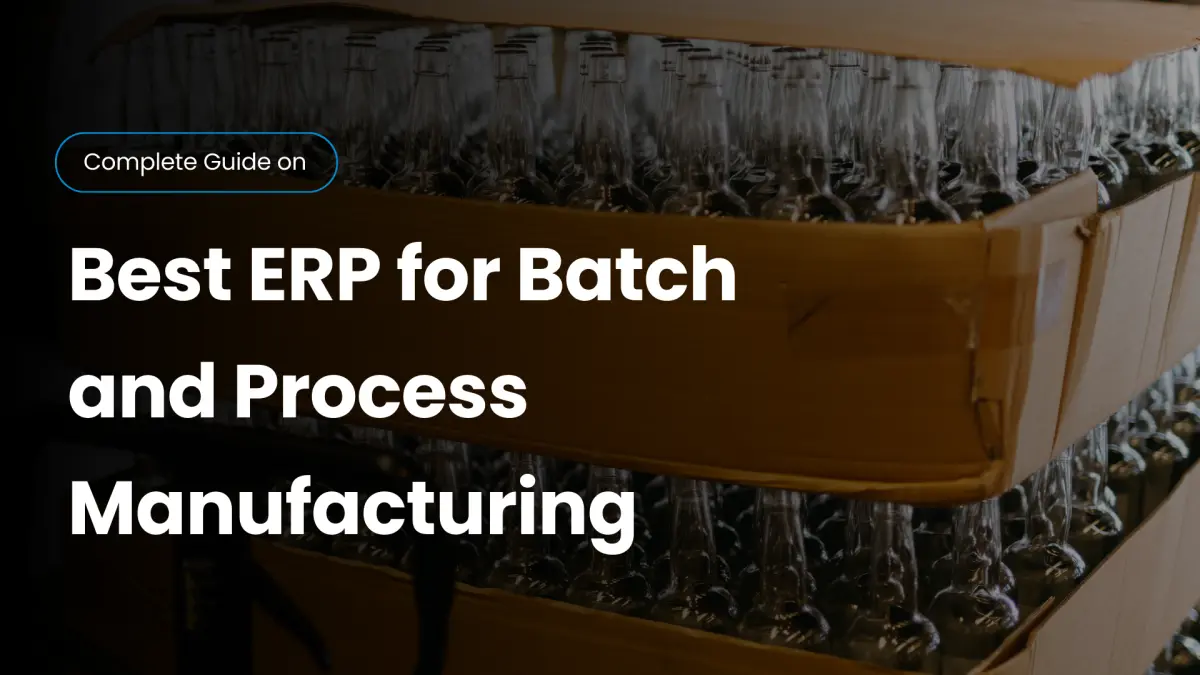Efficient, streamlined operations aren’t just about cutting costs in batch and process manufacturing; they’re about staying competitive in a dynamic market. Companies in this niche deal with unique complexities like strict regulatory compliance, perishability of materials, and balancing supply chain demands. But how do you manage it all effectively?
Enter ERP (Enterprise Resource Planning) systems. Specifically tailored for batch and process manufacturers, these software solutions can help streamline operations, ensure compliance, and elevate productivity. If you’re in the market for a batch and process manufacturing ERP, this guide will help you understand the challenges, the key features to look for, the top ERP options, and best practices for implementation.
Table of Contents
- Why ERP is Crucial for Batch and Process Manufacturing
- Top ERP Systems for Batch and Process Manufacturing
- 1. SAP S/4HANA
- 2. Microsoft Dynamics 365 Supply Chain Management
- 3. Oracle NetSuite
- 4. ProcessPro
- 5. Infor CloudSuite Process Manufacturing
- Alternative Solution for Smaller Businesses
- Key Challenges in Batch and Process Manufacturing
- 1. Regulatory Compliance
- 2. Variability in Raw Materials
- 3. Demand Forecasting
- 4. Batch Traceability
- 5. Managing Complex Formulas and Recipes
- Features for Batch and Process Manufacturers
- 1. Formula and Recipe Management
- 2. Lot and Batch Traceability
- 3. Quality Control
- 4. Material Requirements Planning (MRP)
- 5. Regulatory Compliance Tools
- 6. Real-Time Reporting & Analytics
- 7. Production Scheduling and Scalability
- Case Studies: ERP Success in Manufacturing
- Case Study 1: Food Manufacturer Enhances Traceability
- Case Study 2: Chemical Company Optimizes Inventory
- ERP Implementation Best Practices
- 1. Define Your Needs
- 2. Secure Employee Buy-In
- 3. Choose the Right Vendor
- 4. Train Your Team
- 5. Test Rigorously Before Go-Live
- Conclusion:
Why ERP is Crucial for Batch and Process Manufacturing
Manufacturers and professionals in batch and process manufacturing deal with unique challenges that aren’t typically seen in discrete manufacturing. ERP systems customized to this sector allow businesses to manage formulas and recipes, track regulatory compliance, maintain quality control, and efficiently manage inventory across production cycles.
Whether you’re running a food processing company, a chemical plant, or a pharmaceutical manufacturing operation, the need for a process manufacturing ERP is undeniable. It becomes the backbone of your processes, offering a single source of truth for operations and helping to mitigate risks, ensure compliance, and optimize workflows.
Top ERP Systems for Batch and Process Manufacturing
There’s no shortage of ERP systems on the market, but only a few stand out as best-suited for batch and process manufacturing. Here’s a list of some tried-and-tested process manufacturing ERP solutions.
1. SAP S/4HANA
SAP S/4HANA is a global leader in ERP solutions. With capabilities like production planning, advanced analytics, and compliance management, it’s a robust option for midsize-to-enterprise-level manufacturers.
2. Microsoft Dynamics 365 Supply Chain Management
This highly flexible ERP system offers tools for inventory tracking, production forecasting, and warehouse management. Its integration with Microsoft’s ecosystem is also a big plus.
3. Oracle NetSuite
Oracle NetSuite provides comprehensive functionality tailored to batch manufacturers, with features like recipe management, lot traceability, and real-time supply chain insights.
4. ProcessPro
ProcessPro is specifically designed for small- to mid-sized process manufacturers. It offers strong features around lot traceability, compliance tracking, and formula-based production management.
5. Infor CloudSuite Process Manufacturing
Infor’s CloudSuite solution boasts advanced tools for recipe management, traceability, and quality control, making it highly suitable for food, chemical, and pharmaceutical manufacturers.
Alternative Solution for Smaller Businesses
Above all, ERP software can be costly and is typically suited for large enterprises that manage operations on a large scale in complex environments. However, if you are a startup with a limited budget, we have a smart solution for your business.
ERPNext is an excellent choice for its advantages over other software, such as Odoo. No, doubt Odoo has its advantages, but if you are an SME and want to upgrade to ERP, then ERPNext is the best decision for your future growing business
If you’re ready to implement ERPNext for your business, Contact us today
Key Challenges in Batch and Process Manufacturing
Before choosing an ERP system, it’s essential to know the key challenges that batch and process manufacturers face. Your chosen system should help you overcome these issues effectively.
1. Regulatory Compliance
Industries like food, chemicals, and pharmaceuticals are subject to stringent regulatory requirements. Manufacturers must ensure full traceability, accurate labeling, and robust audit trails. Non-compliance can lead to fines, product recalls, or, worse, legal complications.
2. Variability in Raw Materials
Unlike discrete manufacturing, process manufacturers deal with variability in raw materials, which may carry inconsistencies in quality or availability. This requires precision in formula management to ensure uniform product quality.
3. Demand Forecasting
Supply chain disruptions and fluctuating customer demands make it challenging to manage inventory levels. Without accurate demand forecasting, manufacturers risk overproduction or undersupply, both of which can hurt profitability.
4. Batch Traceability
From sourcing raw materials to final production, batch manufacturers need complete visibility across the supply chain. Lack of batch tracking can lead to operational inefficiencies and audit issues.
5. Managing Complex Formulas and Recipes
Batch manufacturing involves intricate formulas that require precision. Alterations to these formulas must be documented meticulously. A robust ERP solution ensures these formulas are managed and scaled effortlessly.
Features for Batch and Process Manufacturers
When evaluating the best batch process manufacturing ERP, ensure your solution offers the following features to manage the above challenges effectively.

1. Formula and Recipe Management
A good ERP system will allow you to manage, tweak, and scale formulas or recipes while maintaining quality consistency. This feature ensures proper documentation and streamlines adjustments.
2. Lot and Batch Traceability
Traceability is non-negotiable for regulatory compliance and quality control. Look for an ERP with comprehensive lot and batch tracking capabilities for end-to-end visibility.
3. Quality Control
Continuous quality checks are a must in process manufacturing ERP systems. Predefined quality standards and real-time quality checks ensure that your final product meets compliance and customer expectations.
4. Material Requirements Planning (MRP)
Material inventory management is crucial for proper forecasting and avoiding shortages or overstock situations. An ERP with robust MRP ensures optimized inventory levels.
5. Regulatory Compliance Tools
Ensure the ERP provides built-in compliance management features for industry-specific regulations, automating tasks like data recording, labeling, and auditing.
6. Real-Time Reporting & Analytics
Actionable insights are crucial for identifying bottlenecks and improving decision-making. An ERP with strong reporting capabilities empowers manufacturing managers with real-time analysis.
7. Production Scheduling and Scalability
Choose an ERP that allows for flexibility in scaling production schedules while taking constraints, like available raw materials or labor, into account.
Case Studies: ERP Success in Manufacturing
Case Study 1: Food Manufacturer Enhances Traceability
A mid-sized food manufacturer implemented Oracle NetSuite to address inefficiencies in batch tracking. Post-implementation, they achieved full traceability across their supply chain, reducing product recalls by 60%.
Case Study 2: Chemical Company Optimizes Inventory
A chemical manufacturer used SAP S/4HANA to implement predictive analytics for inventory forecasting. This ensured they maintained optimal raw material levels and reduced wastage by 25%.
ERP Implementation Best Practices
Implementing an ERP isn’t just about picking the right solution; it’s about setting your business up for success. Here’s how to approach implementation correctly.
1. Define Your Needs
List out your manufacturing challenges, goals, and what you want to achieve with ERP to ensure alignment with your chosen solution.
2. Secure Employee Buy-In
Ensure your entire team—from floor workers to management—is on board by clearly communicating the benefits.
3. Choose the Right Vendor
Select a vendor experienced in your industry, with a proven track record for successful ERP implementations in batch and process manufacturing.
4. Train Your Team
Invest in comprehensive training so your team can utilize the ERP to its full potential.
5. Test Rigorously Before Go-Live
Perform pilot testing and troubleshoot any issues before rolling out the system fully.
Conclusion:
Choosing the right ERP for batch and process manufacturing is more than just a tech decision—it’s a strategic move that can streamline operations, cut down inefficiencies, and set the stage for real growth. Whether it’s built-in compliance, detailed recipe management, or better inventory control, today’s ERPs are essential tools for staying competitive.
The key is to take a step back and really understand your business needs. Focus on the features that matter most to your processes, and look for systems with a proven track record in your industry. With the right planning and a solid implementation strategy, an ERP can do more than just manage data—it can completely transform how you work.
Need guidance on the best ERP solution for your business? Start exploring today to unlock your industry’s potential and streamline your operations!

